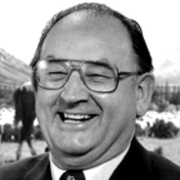
Fred Barnes
When Fred Barnes presented the first episode of Country Calendar on 6 March 1966, he told viewers that although the programme was directed “specifically at the farming community I hope that townsfolk will find it interesting too.”
They certainly did. When Barnes left the show in 1970 to concentrate on his main job of managing rural broadcasts for the state broadcaster, newspaper The Dominion was joined by many fans in an unsuccessful campaign to get him back on air.
Barnes watched as Country Calendar became the only programme from the early years of the NZBS and NZBC to thrive — as well as change — beyond the 60s. It was still going strong in 1993, when Barnes passed away.
Born 19 June 1920, Fred Barnes spent time as a navy sub-lieutenant, diary farmer and primary teacher before joining the New Zealand Broadcasting Service in 1957. Like many future Country Calendar producers (including Tony Trotter, Colin Follas and Frank Torley), he did time as a rural radio broadcaster, working in the Waikato.
In the mid 60s Barnes was given the brief “to organise and compere a television version of radio's daily farming session”. The show began with a core crew of Barnes, a production secretary, and an agriculturally-impaired Italian director whose exploits would inspire many future tales (like insisting Godfrey Bowen shear left-handed, and asking one farmer not wear his tie on-screen).
Barnes began as both reporter and pipe-smoking presenter, in a show that was more news-orientated and studio based than later versions. From the beginning though, it was trying to balance two audiences: farmers, and everyone else. A team of rural broadcasters were soon supplying news items. “I had editorial control and selected the items,” he told the Listener in 1975, “but Country Calendar has always been a team operation.” In another interview he expressed pride at having worked on a programme made for the public good, which helped to “cement relations between town and country”.
By 1967 Barnes was balancing his Country Calendar duties with the top job as supervisor of rural broadcasts for the New Zealand Broadcasting Corporation, the then-parent organisation for both radio and television.
When Barnes stopped presenting Country Calendar in 1970, Wellington’s Dominion newspaper began a campaign to get him back on air, claiming they'd received 100s of letters praising him during his time on air. Calling the show “one of our most important public service programmes”, Christine Cole argued that its universal appeal was due to his “unique personal qualities” as frontman. She found him “natural, friendly and knowledgeable”.
The Dominion published limericks from farmers lamenting Barnes' departure, and the paper's writers argued Barnes was one of the few “men in our TV who are universally regarded as just right for the job”.
Eventually Barnes wrote in to the paper to explain that demands on his time as rural broadcasts supervisor had made it “increasingly difficult” to appear regularly on screen. He added that in broadcasting and other fields, the time comes when “a person must undertake more administrative duties if he is interested in personal advancement”. But by 1985 he was putting a different spin on why he had left the presenter job: “My controller said I was too popular and knew too many important people”.
In the mid 70s, when radio and television were split into separate organisations, Barnes left television and commanded rural broadcasts for Radio New Zealand. In 1976 he was seconded for the first time to a job in Kuala Lumpur. In Malaysia he trained broadcasters from Asia and the Pacific, under a scheme supported by Unesco and various state broadcasters, including New Zealand.
Later he headed RNZ's overseas programmes team (officially the ‘External Services Division’). Barnes retired in 1984, ironically shortly before being returning to television for three special 'looking back' episodes on Country Calendar, marking 25 years of New Zealand television.
Barnes died on 13 March 1993 in Palmerston North, from complications of motor neurone disease.
Sources include
Infofind - Radio New Zealand Library
Fred Barnes, 'Fred Barnes has other jobs to do' (Letter to the Editor) – The Dominion, 4 April 1970
Christine Cole, ‘Has the N.Z.B.C really ‘chopped’ Fred Barnes?’ ('Viewing with Christine Cole' column) - The Dominion, 28 February 1970
Christine Cole, ‘Save Fred Barnes movement will grow’ ('Viewing with Christine Cole' column) - The Dominion, 7 May 1970
Barry Hawkins, 'Cockies' tales and the bionic sheep'- The Evening Post (TV Week pullout) - 10 June 1991, page 3
Karen Jackman, 'Final Month Of 'Calendar' For Fred Barnes' (Interview) – The NZ Listener, 1 March 1975, page 14
Barry Shaw, ‘A fitting monument’ (Review of Holmes) - The NZ Herald, 17 March 1993
Howard Smith, ‘‘Country Calendar’s Fred Barnes now relocated behind scenes’ ('Viewing with Howard Smith' column) - The Dominion, 17 February 1970, page 15
‘The father of Country Calendar’ (Obituary) - The Evening Post, 1 April 1993
‘Too popular’ (Interview) - The Auckland Star, 22 June 1985
‘Radio Post in Malaysia’ - The Evening Post, 25 January 1976